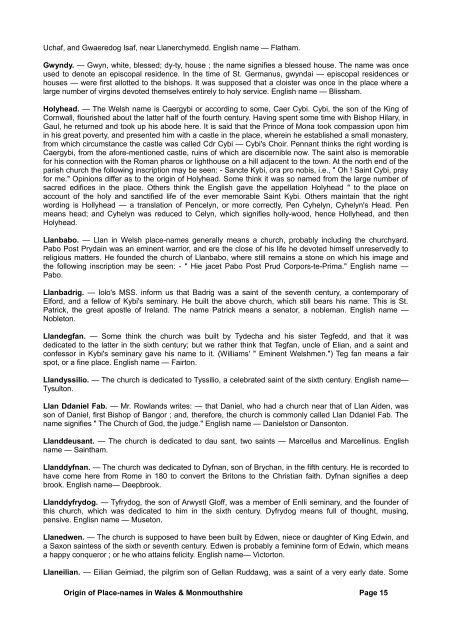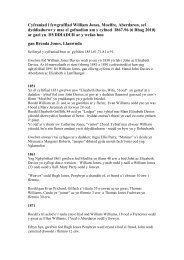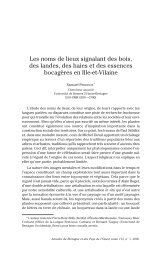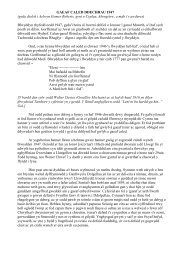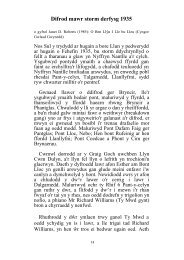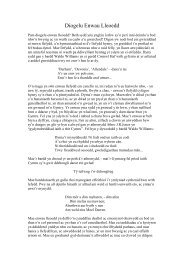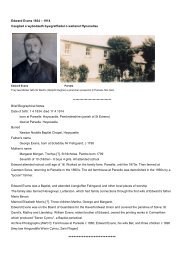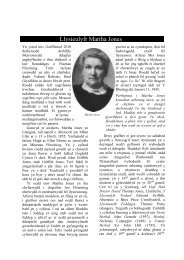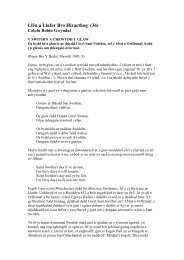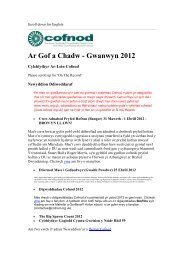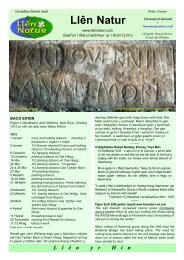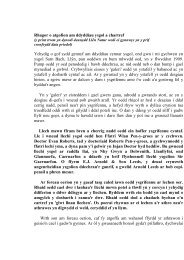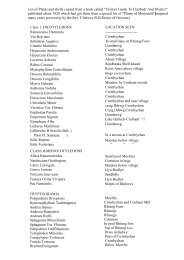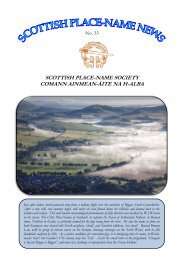Uchaf, <strong>and</strong> Gwaeredog Isaf, near Llanerchymedd. English name — Flatham.Gwyndy. — Gwyn, white, blessed; dy-ty, house ; <strong>the</strong> name signifies a blessed house. The name was onceused to denote an episcopal residence. In <strong>the</strong> time <strong>of</strong> St. Germanus, gwyndai — episcopal residences orhouses — were first allotted to <strong>the</strong> bishops. It was supposed that a cloister was once <strong>in</strong> <strong>the</strong> <strong>place</strong> where alarge number <strong>of</strong> virg<strong>in</strong>s devoted <strong>the</strong>mselves entirely to holy service. English name — Blissham.Holyhead. — The Welsh name is Caergybi or accord<strong>in</strong>g to some, Caer Cybi. Cybi, <strong>the</strong> son <strong>of</strong> <strong>the</strong> K<strong>in</strong>g <strong>of</strong>Cornwall, flourished about <strong>the</strong> latter half <strong>of</strong> <strong>the</strong> fourth century. Hav<strong>in</strong>g spent some time with Bishop Hilary, <strong>in</strong>Gaul, he returned <strong>and</strong> took up his abode here. It is said that <strong>the</strong> Pr<strong>in</strong>ce <strong>of</strong> Mona took compassion upon him<strong>in</strong> his great poverty, <strong>and</strong> presented him with a castle <strong>in</strong> <strong>the</strong> <strong>place</strong>, where<strong>in</strong> he established a small monastery,from which circumstance <strong>the</strong> castle was called Cdr Cybi — Cybi's Choir. Pennant th<strong>in</strong>ks <strong>the</strong> right word<strong>in</strong>g isCaergybi, from <strong>the</strong> afore-mentioned castle, ru<strong>in</strong>s <strong>of</strong> which are discernible now. The sa<strong>in</strong>t also is memorablefor his connection with <strong>the</strong> Roman pharos or lighthouse on a hill adjacent to <strong>the</strong> town. At <strong>the</strong> north end <strong>of</strong> <strong>the</strong>parish church <strong>the</strong> follow<strong>in</strong>g <strong>in</strong>scription may be seen: - Sancte Kybi, ora pro nobis, i.e., " Oh ! Sa<strong>in</strong>t Cybi, prayfor me." Op<strong>in</strong>ions differ as to <strong>the</strong> <strong>orig<strong>in</strong></strong> <strong>of</strong> Holyhead. Some th<strong>in</strong>k it was so named from <strong>the</strong> large number <strong>of</strong>sacred edifices <strong>in</strong> <strong>the</strong> <strong>place</strong>. O<strong>the</strong>rs th<strong>in</strong>k <strong>the</strong> English gave <strong>the</strong> appellation Holyhead " to <strong>the</strong> <strong>place</strong> onaccount <strong>of</strong> <strong>the</strong> holy <strong>and</strong> sanctified life <strong>of</strong> <strong>the</strong> ever memorable Sa<strong>in</strong>t Kybi. O<strong>the</strong>rs ma<strong>in</strong>ta<strong>in</strong> that <strong>the</strong> rightword<strong>in</strong>g is Hollyhead — a translation <strong>of</strong> Pencelyn, or more correctly, Pen Cyhelyn, Cyhelyn's Head. Penmeans head; <strong>and</strong> Cyhelyn was reduced to Celyn, which signifies holly-wood, hence Hollyhead, <strong>and</strong> <strong>the</strong>nHolyhead.Llanbabo. — Llan <strong>in</strong> Welsh <strong>place</strong>-<strong>names</strong> generally means a church, probably <strong>in</strong>clud<strong>in</strong>g <strong>the</strong> churchyard.Pabo Post Pryda<strong>in</strong> was an em<strong>in</strong>ent warrior, <strong>and</strong> ere <strong>the</strong> close <strong>of</strong> his life he devoted himself unreservedly toreligious matters. He founded <strong>the</strong> church <strong>of</strong> Llanbabo, where still rema<strong>in</strong>s a stone on which his image <strong>and</strong><strong>the</strong> follow<strong>in</strong>g <strong>in</strong>scription may be seen: - " Hie jacet Pabo Post Prud Corpors-te-Prima." English name —Pabo.Llanbadrig. — Iolo's MSS. <strong>in</strong>form us that Badrig was a sa<strong>in</strong>t <strong>of</strong> <strong>the</strong> seventh century, a contemporary <strong>of</strong>Elford, <strong>and</strong> a fellow <strong>of</strong> Kybi's sem<strong>in</strong>ary. He built <strong>the</strong> above church, which still bears his name. This is St.Patrick, <strong>the</strong> great apostle <strong>of</strong> Irel<strong>and</strong>. The name Patrick means a senator, a nobleman. English name —Nobleton.Ll<strong>and</strong>egfan. — Some th<strong>in</strong>k <strong>the</strong> church was built by Tydecha <strong>and</strong> his sister Tegfedd, <strong>and</strong> that it wasdedicated to <strong>the</strong> latter <strong>in</strong> <strong>the</strong> sixth century; but we ra<strong>the</strong>r th<strong>in</strong>k that Tegfan, uncle <strong>of</strong> Elian, <strong>and</strong> a sa<strong>in</strong>t <strong>and</strong>confessor <strong>in</strong> Kybi's sem<strong>in</strong>ary gave his name to it. (Williams' " Em<strong>in</strong>ent Welshmen.") Teg fan means a fairspot, or a f<strong>in</strong>e <strong>place</strong>. English name — Fairton.Ll<strong>and</strong>yssilio. — The church is dedicated to Tyssilio, a celebrated sa<strong>in</strong>t <strong>of</strong> <strong>the</strong> sixth century. English name—Tysulton.Llan Ddaniel Fab. — Mr. Rowl<strong>and</strong>s writes: — that Daniel, who had a church near that <strong>of</strong> Llan Aiden, wasson <strong>of</strong> Daniel, first Bishop <strong>of</strong> Bangor ; <strong>and</strong>, <strong>the</strong>refore, <strong>the</strong> church is commonly called Llan Ddaniel Fab. Thename signifies " The Church <strong>of</strong> God, <strong>the</strong> judge." English name — Danielston or Dansonton.Ll<strong>and</strong>deusant. — The church is dedicated to dau sant, two sa<strong>in</strong>ts — Marcellus <strong>and</strong> Marcell<strong>in</strong>us. Englishname — Sa<strong>in</strong>tham.Ll<strong>and</strong>dyfnan. — The church was dedicated to Dyfnan, son <strong>of</strong> Brychan, <strong>in</strong> <strong>the</strong> fifth century. He is recorded tohave come here from Rome <strong>in</strong> 180 to convert <strong>the</strong> Britons to <strong>the</strong> Christian faith. Dyfnan signifies a deepbrook. English name— Deepbrook.Ll<strong>and</strong>dyfrydog. — Tyfrydog, <strong>the</strong> son <strong>of</strong> Arwystl Gl<strong>of</strong>f, was a member <strong>of</strong> Enlli sem<strong>in</strong>ary, <strong>and</strong> <strong>the</strong> founder <strong>of</strong>this church, which was dedicated to him <strong>in</strong> <strong>the</strong> sixth century. Dyfrydog means full <strong>of</strong> thought, mus<strong>in</strong>g,pensive. Englisn name — Museton.Llanedwen. — The church is supposed to have been built by Edwen, niece or daughter <strong>of</strong> K<strong>in</strong>g Edw<strong>in</strong>, <strong>and</strong>a Saxon sa<strong>in</strong>tess <strong>of</strong> <strong>the</strong> sixth or seventh century. Edwen is probably a fem<strong>in</strong><strong>in</strong>e form <strong>of</strong> Edw<strong>in</strong>, which meansa happy conqueror ; or he who atta<strong>in</strong>s felicity. English name— Victorton.Llaneilian. — Eilian Geimiad, <strong>the</strong> pilgrim son <strong>of</strong> Gellan Ruddawg, was a sa<strong>in</strong>t <strong>of</strong> a very early date. SomeOrig<strong>in</strong> <strong>of</strong> Place-<strong>names</strong> <strong>in</strong> Wales & Monmouthshire Page 15
th<strong>in</strong>k he was a contemporary <strong>of</strong> St. Kybi. A few churches <strong>in</strong> Wales bear his name. English name —Pilgrimton.Llanerchymedd. — This town was anciently called Chehran, clock, bell; tan, part, portion. It is supposedthat <strong>the</strong> steeple <strong>of</strong> <strong>the</strong> church stood on portions <strong>of</strong> three, if not four parishes, hence <strong>the</strong> name. Variousstructures are propounded on <strong>the</strong> <strong>orig<strong>in</strong></strong> <strong>of</strong> <strong>the</strong> present one. An old tradition says that a man named Teger<strong>in</strong>was prepar<strong>in</strong>g a family grave on <strong>the</strong> spot where <strong>the</strong> old church st<strong>and</strong>s, <strong>and</strong>, when he was build<strong>in</strong>g <strong>the</strong> vault,someone asked him — " What do you raise on this l<strong>and</strong>?" His rejo<strong>in</strong>der was, " Llanerch fy medd" <strong>the</strong> <strong>place</strong> <strong>of</strong>my sepulchre. Some derive <strong>the</strong> name from vn y medd, a mead tavern. Medd, mead, a dr<strong>in</strong>k <strong>of</strong> honey <strong>and</strong>water; that ancient beverage was ably prepared <strong>and</strong> consumed at <strong>the</strong> above tavern, hence <strong>the</strong> name.English name — Meadham.Llaneugrad. — The church was dedicated to Lleugrad, son <strong>of</strong> Caw Cawlwyd, a fellow <strong>of</strong> Illtyd's sem<strong>in</strong>ary,<strong>and</strong> a sa<strong>in</strong>t <strong>of</strong> <strong>the</strong> sixth century. English name — Eugrad.Llanfachreth. — A local tradition has it that a ???? once found its way to <strong>the</strong> <strong>place</strong> from Holyhead, someoneasked, i* bleyr aeth ? Where did it go ? The answer was, I Ian fach yr aeth, to Lanfach it went; hence lame.We ra<strong>the</strong>r th<strong>in</strong>k <strong>the</strong> church was dedicated to Machraith, who flourished <strong>in</strong> <strong>the</strong> seventh century, he foundedchurches <strong>in</strong> Merioneth <strong>and</strong> Anglesey; hraith signifies <strong>the</strong> law <strong>of</strong> surety-ship. English name — Bailton.Llanfaelog. — The church was dedicated about <strong>the</strong> eventh century to Maelog, son <strong>of</strong> Caw Cawlwyd. Hardabout <strong>the</strong>re is a little pool called " Llyn Maelog," Maelog's pool. Maelog is a derivative <strong>of</strong> maelio, to getadvantage. to ga<strong>in</strong>, to pr<strong>of</strong>it. English name— Martham.Llanfaes. — Maes, a field. The name denotes a church built on <strong>the</strong> spot where a memorable battle wasfought <strong>in</strong> <strong>the</strong> year 819 between Egbert <strong>and</strong> <strong>the</strong> Welsh. English name — Churchfield.Llanfaethlu. — The church was dedicated to Faehlu, son <strong>of</strong> Caradog Freichfras, <strong>in</strong> <strong>the</strong> sixth century. Mathiuor Maethle means a nurs<strong>in</strong>g <strong>place</strong>. English name — Fosterton.Llanfair-Mathafarn-Eithaf. — The <strong>names</strong> <strong>of</strong> this <strong>the</strong> adjo<strong>in</strong><strong>in</strong>g parish must be compared here <strong>in</strong> order that<strong>the</strong>y may throw light on each o<strong>the</strong>r. Llanbedr-goch, or Llanbedr-Mathafarn-Gwion-Goch, <strong>the</strong> contiguousparish is called Llanbedr, <strong>the</strong> church dedicated to St. Peter; Mathafarn, a mead tavern or <strong>in</strong>n; Gwion Goch,<strong>the</strong> name <strong>of</strong> <strong>the</strong> owner. Now take <strong>the</strong> next. Llanfair, St. Mary's Church; Mathafarn, mead tavern; Eithaf,extreme, fur<strong>the</strong>st ; <strong>the</strong> suffix eithaf was added to <strong>the</strong> latter tavern to dist<strong>in</strong>guish it from <strong>the</strong> o<strong>the</strong>r. Some are <strong>of</strong>op<strong>in</strong>ion that Mathafarn means a pla<strong>in</strong> <strong>of</strong> weep<strong>in</strong>g or grief. If so, <strong>the</strong> adjective eithaf extreme, was added todenote its <strong>in</strong>tensity. We adopt <strong>the</strong> former. English name — Meadton.Llanfair-pwll-gwyngyll. — Llanfair, St. Mary's Church; pwll, pool; gwyn, white; cyll, hazel wood. Ceris Pool,Menai Straits, is contiguous to this <strong>place</strong>, <strong>and</strong> <strong>the</strong> banks <strong>of</strong> <strong>the</strong> straits were sometime covered with whitehazel wood. The name <strong>in</strong> full is supposed to be Llanfairpwllgwyngyllgogeriychwyrndrobwlltysiliogogogogoch— a ra<strong>the</strong>r pretty <strong>and</strong> <strong>in</strong>vit<strong>in</strong>g word to a Saxon tourist. The railway station is called Llanfair P.G., obviously for<strong>the</strong> sake <strong>of</strong> those who cannot master <strong>the</strong> Welsh consonants. English name — Whitwood.Llanfechell. — Mechell or Mechyll, <strong>the</strong> son <strong>of</strong> Eckwydd, was a Welsh bishop, <strong>and</strong> <strong>the</strong> church was dedicatedto him <strong>in</strong> <strong>the</strong> seventh century. He was buried <strong>in</strong> Penrhos Llugwy, <strong>and</strong> Mr. Rowl<strong>and</strong>s (Mona Antiqua) says thatan old stone was found <strong>the</strong>re <strong>in</strong> <strong>the</strong> eighteenth century bear<strong>in</strong>g his name. English name — Macatus.Llanfihangel D<strong>in</strong> Sylwy. — Llanfihangel, St. Michael's Church. D<strong>in</strong> Sylwy, accord<strong>in</strong>g to some, is acontraction <strong>of</strong> Dittos Sylwi, <strong>the</strong> gaz<strong>in</strong>g city; o<strong>the</strong>rs trace it to D<strong>in</strong> Sol, <strong>the</strong> city <strong>of</strong> <strong>the</strong> sun. It is generallybelieved that an old British stronghold stood here, <strong>and</strong> was taken by <strong>the</strong> Romans dur<strong>in</strong>g <strong>the</strong> subjugation <strong>of</strong>Mona. We <strong>of</strong>fer <strong>the</strong> follow<strong>in</strong>g derivation: D<strong>in</strong>, a hill ; syl-syllu, to gaze; wy-gwy, water; <strong>the</strong> name, <strong>the</strong>refore,signifies a church on a hill which comm<strong>and</strong>s a view <strong>of</strong> <strong>the</strong> river or water. English name — Waterview.Llanfihangel Tre'r Beirdd. — Llanfihangel, St. Michael's Church. Tver Beirdd, <strong>the</strong> bards' dwell<strong>in</strong>g-<strong>place</strong>. It issupposed that a Druidic station <strong>and</strong> a bard's sem<strong>in</strong>ary existed here <strong>in</strong> remote times, from whichcircumstance <strong>the</strong> village <strong>and</strong> parish derive <strong>the</strong> name. English name — Bardston.Llangefni. — The name signifies a church on <strong>the</strong> river Cefni, which runs through <strong>the</strong> <strong>place</strong>. Cefni is probablya contraction <strong>of</strong> Cefn-llif-y. great or high flood. English name — Floodnam.Orig<strong>in</strong> <strong>of</strong> Place-<strong>names</strong> <strong>in</strong> Wales & Monmouthshire Page 16
- Page 1 and 2: HANDBOOK OF THE ORIGIN OF PLACE-NAM
- Page 3 and 4: § § § § §The Author begs to st
- Page 5 and 6: pitiful cries of the railway offici
- Page 7 and 8: Bishop Percy says that "in England,
- Page 9 and 10: The city of Chester is still popula
- Page 11 and 12: There's Cumwhitton, Cumwhinton, Cum
- Page 13 and 14: Llwyn in its primary' sense means a
- Page 15 and 16: PLACE-NAMES IN WALES.Wales. — The
- Page 17: Church are generally dedicated to e
- Page 21 and 22: Rhosbeirio. — Rhos, a moor, a dry
- Page 23 and 24: of Brecknock," states that this vic
- Page 25 and 26: Cam cnwir ef Cwmdu,Cwm gwyn yw & n
- Page 27 and 28: Penderyn. — A corruption probably
- Page 29 and 30: Ardudwy. — Ar, upon or above; tud
- Page 31 and 32: to mark its pre-eminence over the o
- Page 33 and 34: Some think that eirw is a corruptio
- Page 35 and 36: present form — Caerfyrddin.Abergw
- Page 37 and 38: place of refuge; hence the name. En
- Page 39 and 40: Llansawyl. — The church was dedic
- Page 41 and 42: eject. The village took its name fr
- Page 43 and 44: house, and attempted to kill an inf
- Page 45 and 46: Gwydir. — Prima facie one may tak
- Page 47 and 48: Nefyn. — The church was probably
- Page 49 and 50: DENBIGHSHIRE.Anglicized form of Din
- Page 51 and 52: Llangollen. — From Collen, a sain
- Page 53 and 54: hands into their pockets to pay a c
- Page 55 and 56: Cefn. — The name signifies a ridg
- Page 57 and 58: Maesgarmon. — Named in honour of
- Page 59 and 60: Abertridwr. — Tridwr, three water
- Page 61 and 62: it is said, was originally built by
- Page 63 and 64: Cwmllynfell. — Cwm, a narrow vale
- Page 65 and 66: Gwarycaeau. — Gwdr, the nape of t
- Page 67 and 68: means a cultivated region, a vale,
- Page 69 and 70:
Penrhiwfer.- Pen, head, top; rhiw,
- Page 71 and 72:
Port Talbot. — So called in 1835
- Page 73 and 74:
Trealaw. — This appellation was g
- Page 75 and 76:
Aberdyfi. — So called from its si
- Page 77 and 78:
Llanddwywe. — From Dwywau, a desc
- Page 79 and 80:
Crickhowell and some in the directi
- Page 81 and 82:
Griffithstown. — This village was
- Page 83 and 84:
and gwy, water. Treiddiod troth tna
- Page 85 and 86:
derive Tintern from din, fortified
- Page 87 and 88:
Caersws. — It appears that the Ro
- Page 89 and 90:
English name — Ervylton.Llanymech
- Page 91 and 92:
Angle. — Probably from the angle-
- Page 93 and 94:
Gellyswick. — Another hybrid. Gel
- Page 95 and 96:
that the two rivers in their flowin
- Page 97 and 98:
ecame the bishop of the see, and wa
- Page 99 and 100:
earth formerly stood on a summit on
- Page 101 and 102:
Pilleth. — A corruption of pwll,
- Page 103 and 104:
Howells, Rev. J., Mountain AshHowel
- Page 105 and 106:
Williams, D., PenywernWilliams, Rev


